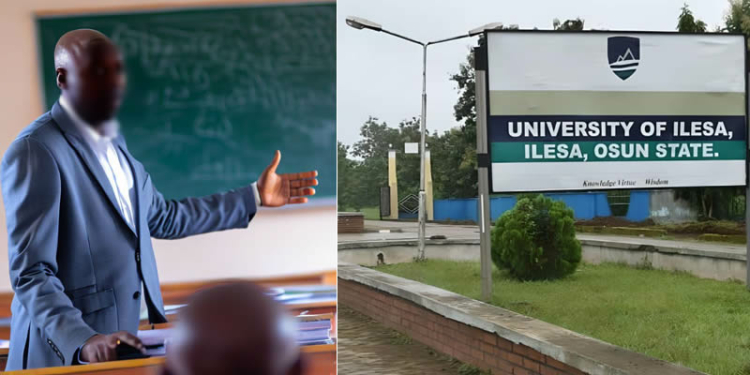Both Ijesa elites and commoners, particularly the temporary college staff who had worked for years and earned higher degrees while earning little, believed that the upgrading would be a major positive shift in their lives through self and societal development when Osun State College of Education, Ilesa, was upgraded to the University of Ilesa. They are currently biting their fingers in sorrow months after the college was upgraded to a university because the anticipated rewards are within the reach of a few.
As the reporter entered the citadel of learning, it was easy to be fooled by the beautifully restored buildings that were primarily built by the Tertiary Education Trust Fund (TETFUND). The reporter came to the conclusion that the lives of the majority of the university’s staff—academic, non-academic, and temporary employees—as well as the students—are just as beautiful as the buildings.

The sight of the refurbished buildings originally tricked this reporter as well, but after doing more research, he found that for staff and students, it is more like hell than paradise. The 47-year-old Felix (not real name), a staff member of UNI-ILESA, told WITHIN NIGERIA that the conditions facing employees and pupils are worse than those facing incarceration.
This story highlights the deafening aspirations of the typical state citizen, even those who are native to the host town, to have access to inexpensive, high-quality education, in addition to exposing the cacophony of change and willful violations of workers’ rights in the citadel of learning. It also reveals how students who pay between N303,000 and over N500,000 and temporary workers who have worked for at least 15 years and earn N23,898.6 a month without benefits manage to survive in this tough and horrible economy.
For employees and learners alike, the University of Ilesa is closer to hell. The screams and sufferings of students and staff, particularly those who are temporary, are inaudible over the campus’s aesthetic beauties. The welfare of faculty, staff, and students is inversely correlated with the school administration’s decision to repaint TETFUND buildings, the reporter found when he visited the campus. When Within Nigeria talked to a few staff members and students at the recently founded university, they opened up about their dissatisfaction and grief. It was undoubtedly an emotional time for everyone.

Lateef (not his actual name) informed this reporter during a chat that he started working as a part-time lecturer in 2013 while it was still a college of education with ties to the Lagos State University and University of Ibadan programs.
I have been employed there as a lecturer for eleven years. For seven years, I have also been a college and UI teacher. I received N17,000 when I was employed, but that amount was eventually raised to N23,896.66—barely two years after I was employed as a temporary staff member in the college. I’m passionate about teaching. This reporter was told by a pretty sad-looking Lateef, “I was supposed to have left the college, but I was hoping that I would be lucky and be employed as a permanent staff member.”

After starting a family and realizing that his pay was insufficient to support them, Lateef claims he was forced to begin teaching classes in his area.
I had intended to quit my job and look for better opportunities once my wife gave birth to our first child. We received word that we would become permanent staff members; therefore, we were advised to persevere and exercise patience. Lateef went on, “I still regret not leaving at that time.”
Adepoju Olalekan (not actual name) began working at the institution that later became a university about 15 years ago as a staff member, but despite obtaining many degrees, all of his efforts to secure a position as a permanent staff member were in vain.
When Olalekan (not real name) started at the college that later became a university, the administration only paid part-time employees once a semester (each part-time lecturer back then made N33,000).

Upon joining the bastion of learning as a part-time lecturer, the 48-year-old man revealed that there were only three or four buildings, and one of his former students is now a lecturer at a private polytechnic.
Permit me to emphasize that I was not fortunate. Despite my best efforts, I was never able to secure a steady job. Many well-known people, even those holding public office, that I met with were unable to assist. I have once received compensation per semester from this institution. In addition, I was earning N17,000 each month, and I’m currently making N23,896.66. With the intention of reaping the rewards of my labor, I launched a business and kept teaching. But Olalekan told this reporter, “I still have hope.”
The 48-year-old man identified as Olalekan told WITHIN NIGERIA how thrilled he was to learn that there were plans to expand the college to a university. He said he celebrated the news like it was his birthday since he had anticipated it would mean a positive change for his family and himself.
“When a coworker informed me about the plan, I was driving.” I had to park and let out a loud cry fit for a lottery winner. I was ecstatic, as I knew that my life would inevitably be impacted by the school’s advancement. Olalekan (not actual name) continued, “I even told my wife that my long-standing desire to become a permanent staff member would be fulfilled because a new university would require more workers and those who had been working for years as temporary staff members would be considered.”
Olalekan (not his actual name) claims that he and his associates believed their success was linked to the citadel of learning’s; hence, they supported the college’s elevation to university status.
Although there were rumors of backdoor employment, we were not hired on as permanent personnel. Furthermore, as temporary employees, we continue to receive N23,896.66 per month. Olalekan said, “We only suffered for nothing.”
Non-academic staff member Sunmisola (not actual name), of the college-turned-university, informed WITHIN NIGERIA that her monthly wage is N23,896.66 without benefits.
While displaying to this reporter the notification of the aforementioned sum that was paid on February 11, just two weeks after the end of January, Sunmisola (not real name) disclosed that the non-academic staff is the most impacted, as they dare not leave the office until 4 p.m. or 5 p.m. or more as instructed by their superiors.
I started a side business using loans, but I regret it because I was unable to keep an eye on it because of work commitments. They won’t give us a good wage, and they still won’t let us take on other responsibilities. My experience is not unlike the experiences of other temporary employees; we only continued because we believed it would be beneficial. Sadly, Sunmisola (not the actual name) described how workers could not even afford to eat well, let alone get themselves to school. If you wait until 4 p.m. or 5 p.m., you will see people jostling for free rides.
The institution’s management lacks a human face, according to another non-academic employee who went by the name Ola.
Ola expressed great disappointment that such an absurd amount could still be preserved in spite of the difficult economic conditions facing the state and the nation as a whole. He bemoaned the fact that temporary staff members have been getting N23,896.66 for over a decade.
Fuel subsidies are no longer available. The country has experienced the highest level of inflation in its history. While Nigerians are fighting for their lives, our institution’s management seems less concerned with the well-being of its employees. Both the public and commercial sectors have seen a 50% or 100% increase in worker salaries. Here I am. As a member of the varsity staff, I continue to receive N23,896.66. Ola bemoaned receiving the same pay that I did ten years ago.
Sade (not her real name), a Department of Public Health student, disclosed to WITHIN NIGERIA that she had paid N370,000 as school fees.
If Sade had realized that she would be paying outrageous tuition for her studies at the college that became a varsity, she claims she would have chosen private institutions like Redeemers, Adeleke, and Kings, among others.
Since both institutions are state-run, I assumed that the tuition would not differ significantly from what Osun State University, Osogbo, students pay. However, I was taken aback when I was informed that, in addition to my admission fee of N45,000, I would also need to pay N370,000 in tuition. Sade revealed that she hardly eats two square meals a day because she doesn’t have enough money to survive.
After paying the N45,000 acceptance fee and the N303,000 tuition fees, another student identified as Sarah (not a real name) told WITHIN NIGERIA.
My parents struggled so hard before I could pay the school fees. In fact, I am always afraid of asking them for money for food and writing materials because I know how I left home. I had done JAMB for four years without gaining admission, and my father really wants me to graduate from a university. So he asked me to pick the University of Ilesa, a newly upgraded college, because he believes that admission would be easier and school fees would be friendly, but we were wrong, the fearful student narrated.
According to the student, survival has been very tough for her because her parents have exhausted their income on her school fees.
I only thank God for my roommate. She has been so supportive and helpful. She is a 300-level student at the Osun State College of Education, affiliated with the University of Ibadan. She is my helper. My friends in the nursing department pay more than N500,000 as school fees. Even if we are in similar terrible circumstances, I truly feel bad for them because mine appears to be better.
EDITOR’S NOTE:
This is the first of a two-part series. Part II is coming soon.
The reporter did not use real names. This was deliberately done because the reporter do not want to subject people he interviewed to possible harassment, intimidation, expulsion, or dismissal from the school management or government.





Discussion about this post